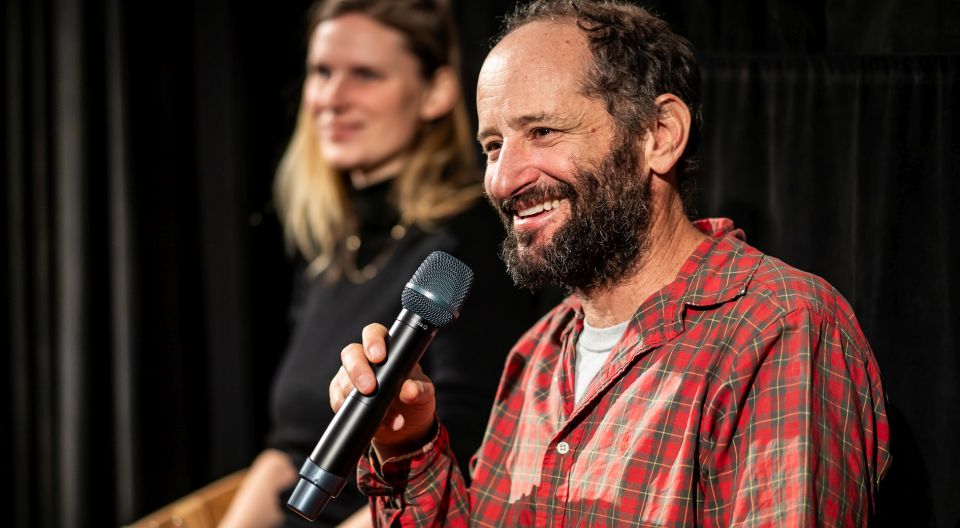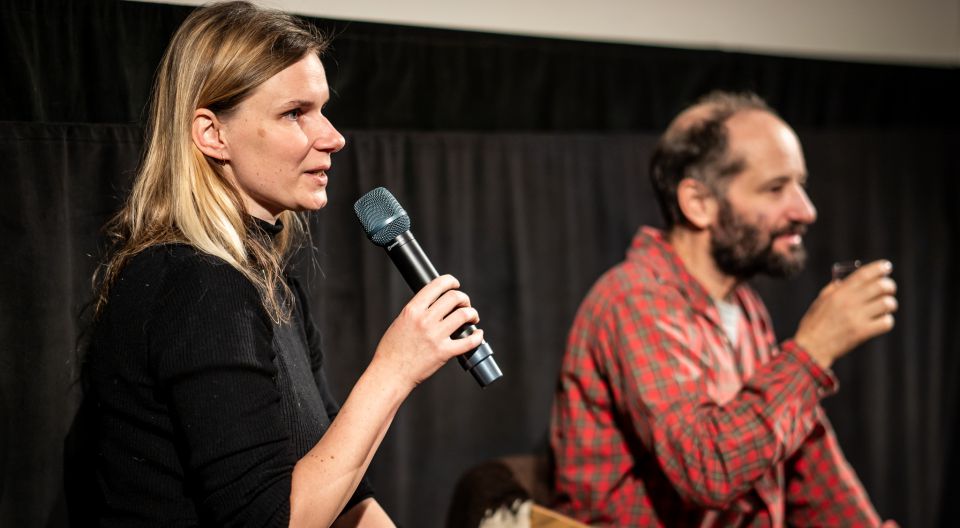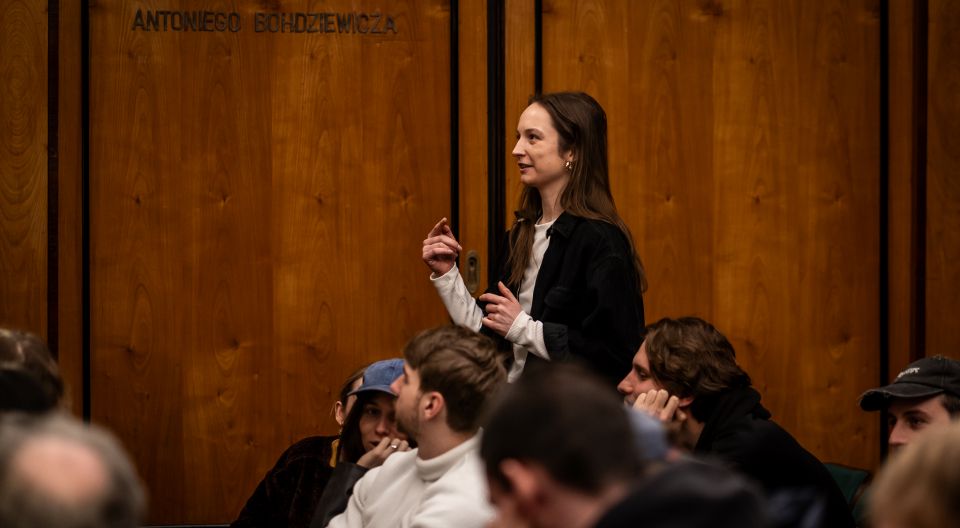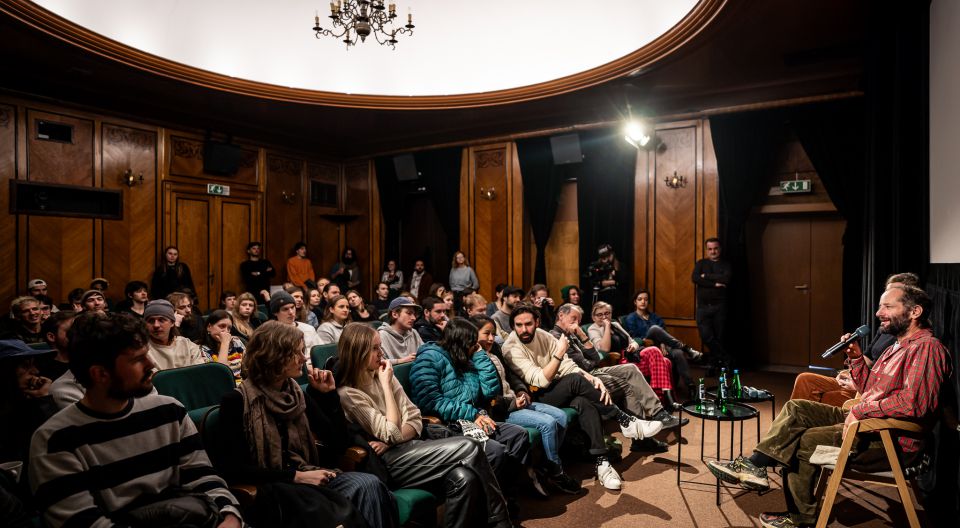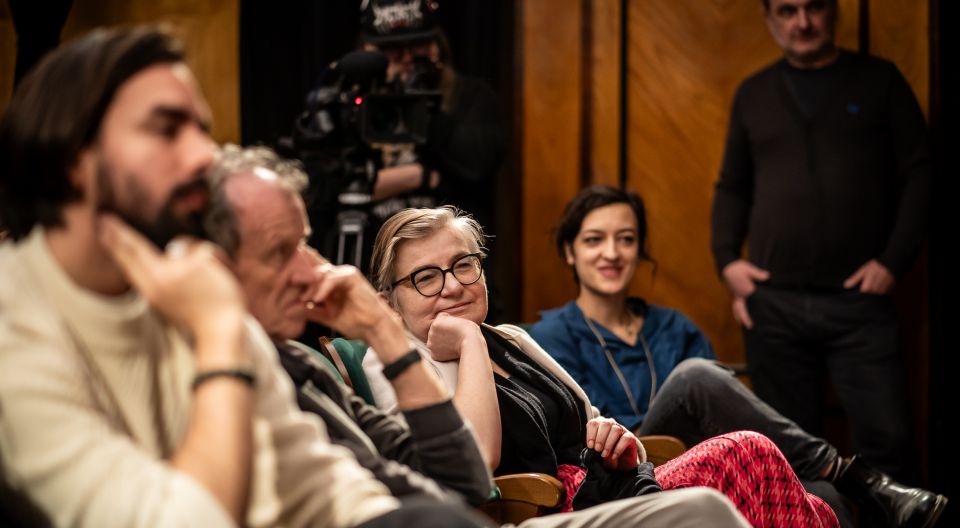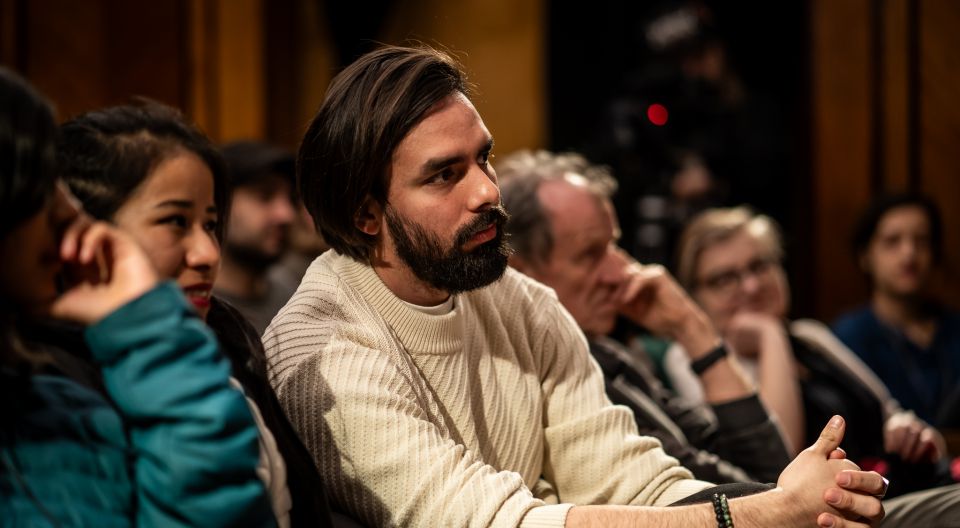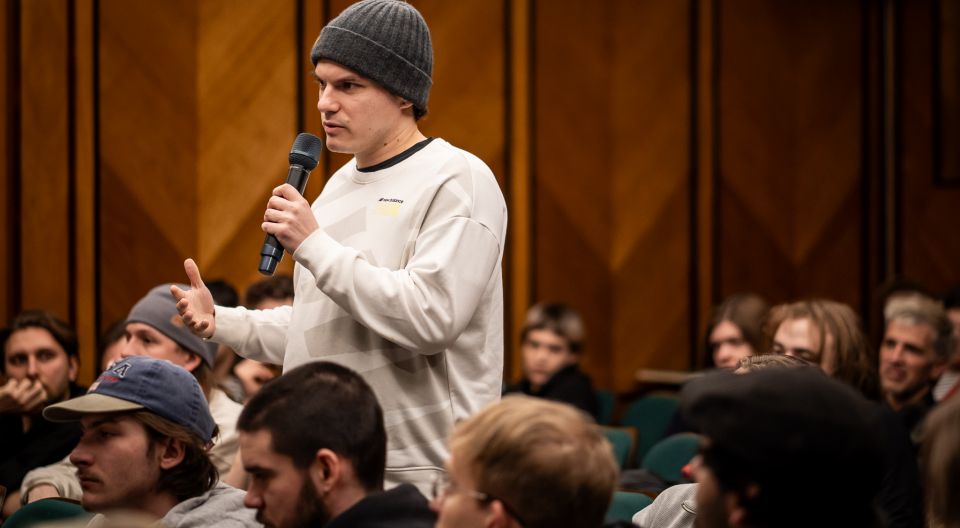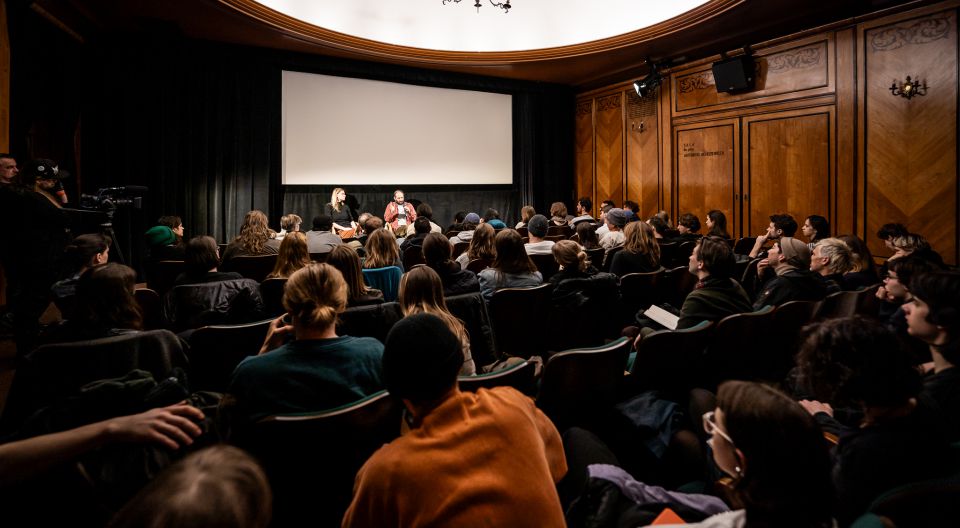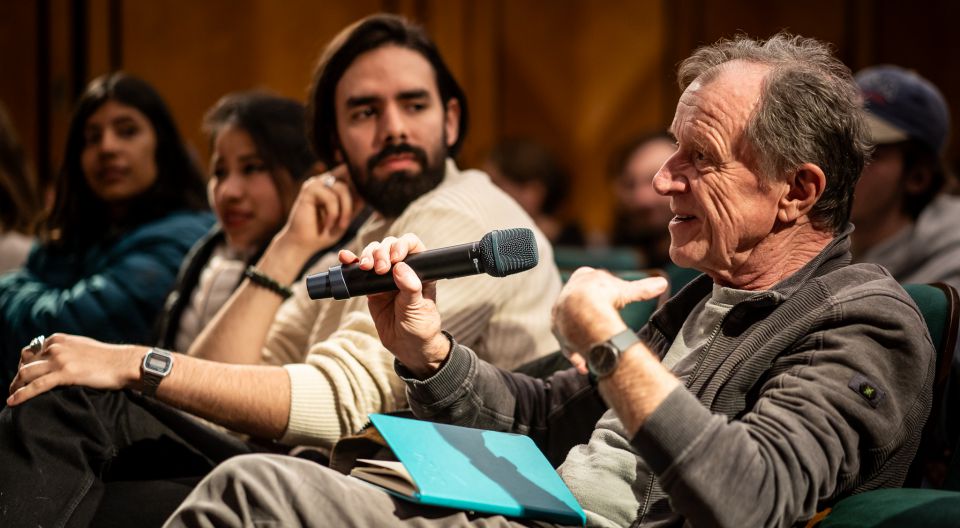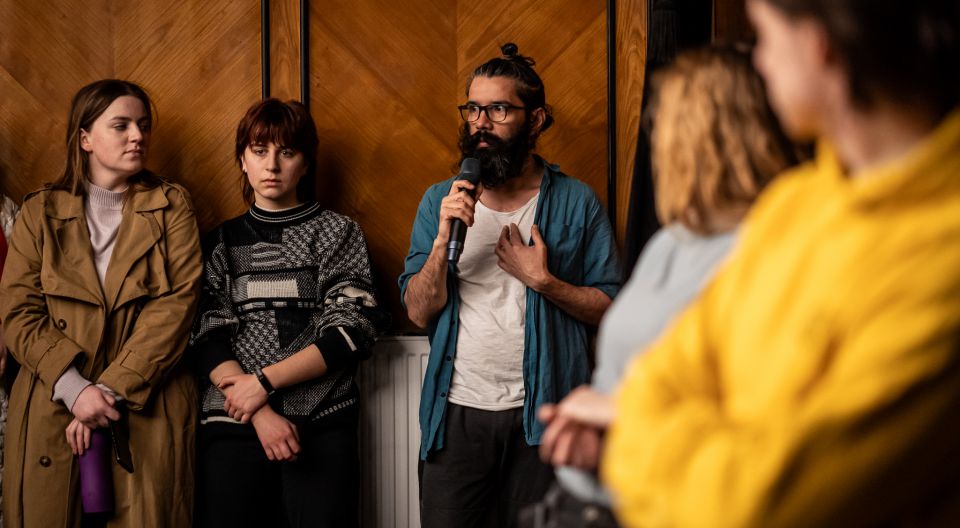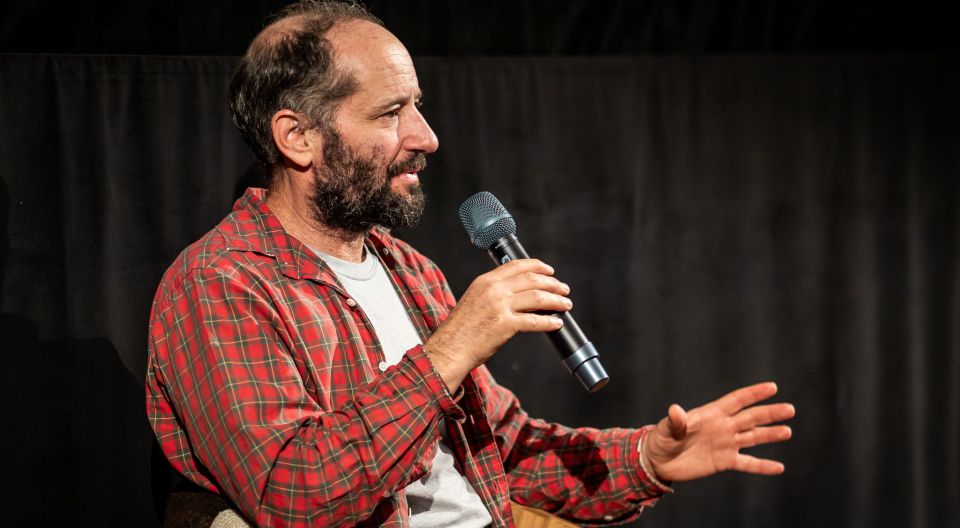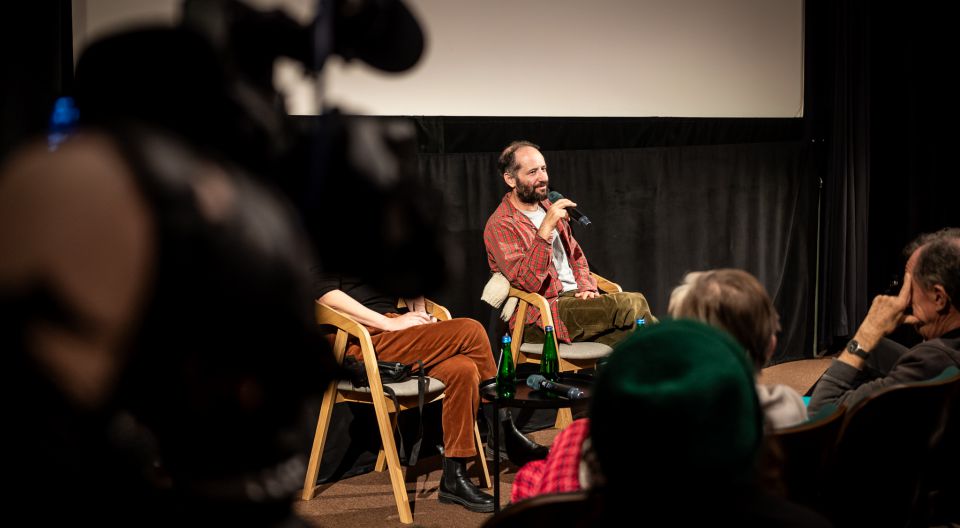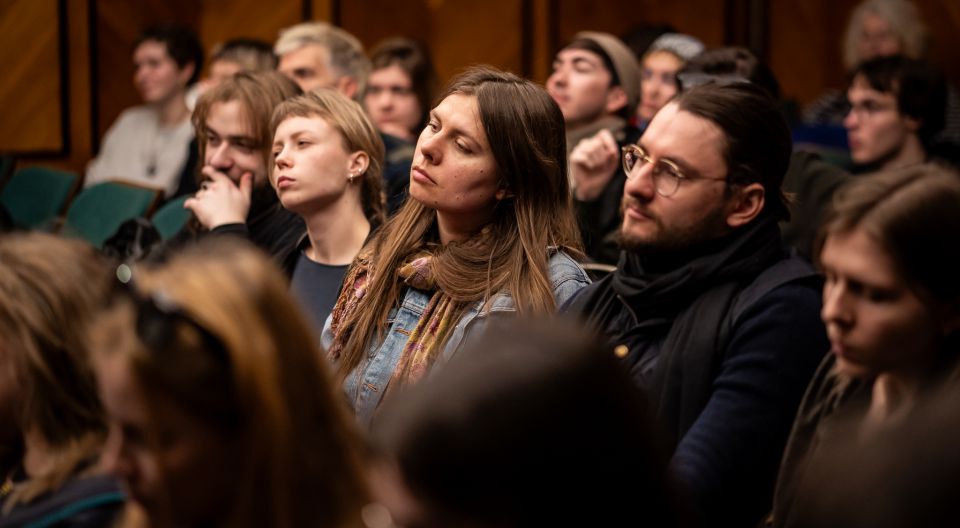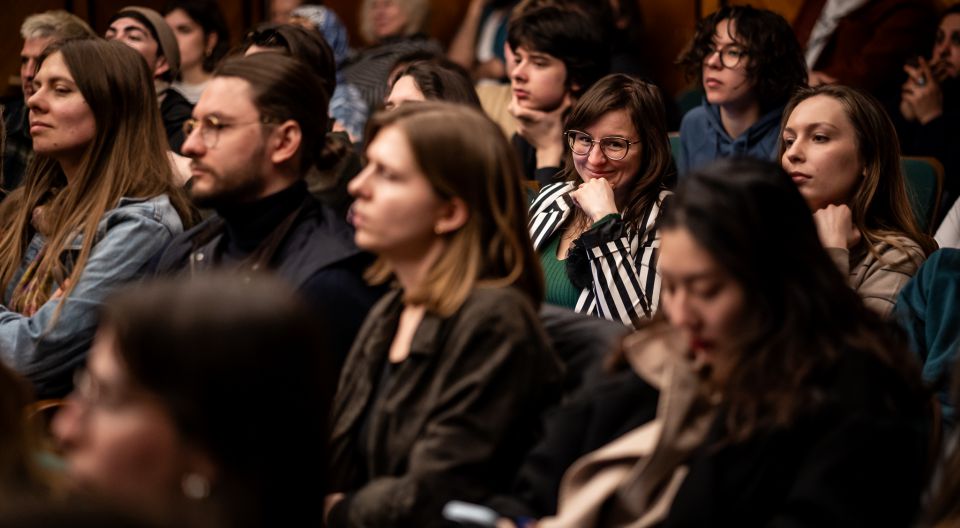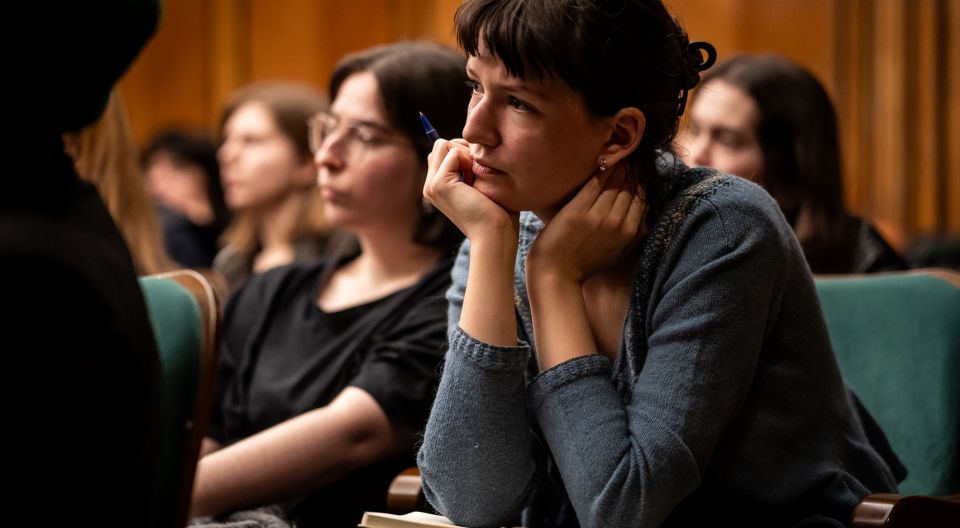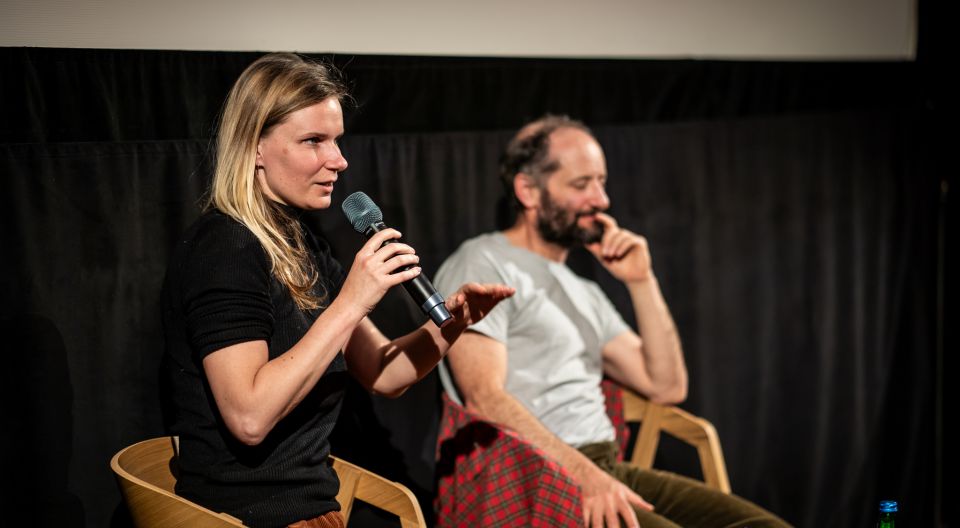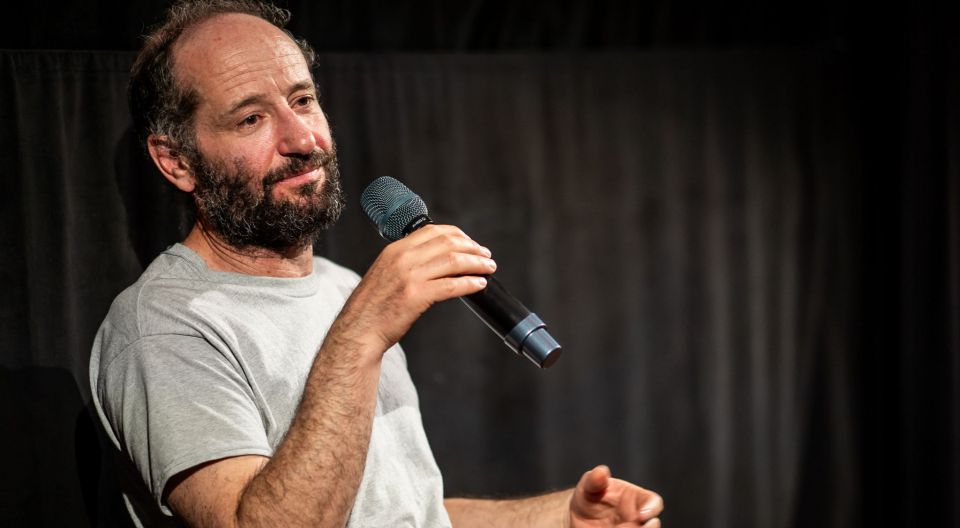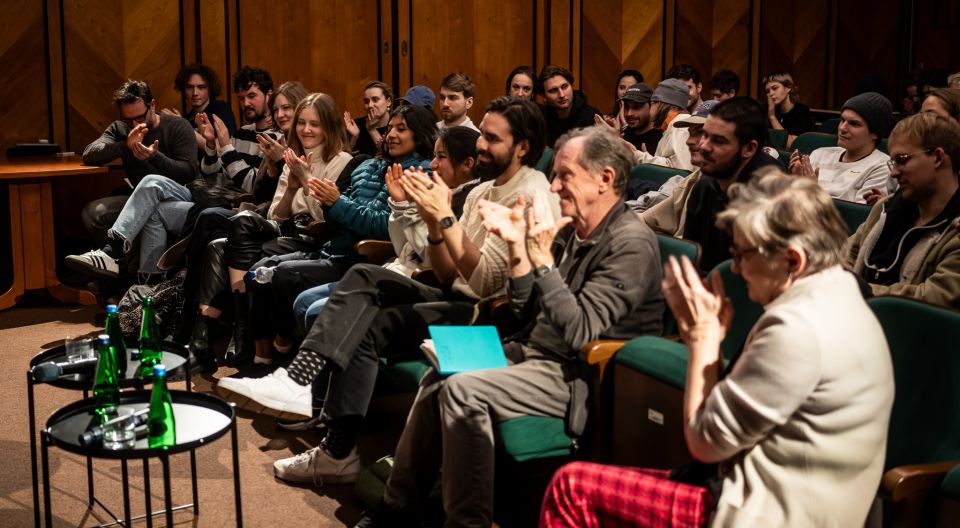21.
03.
2024.
Others
Others
The guest of the Lodz Film School was the outstanding Mexican director, Carlos Reygadas. The artist met with the School community.
Carlos Reygadas came to Poland.
Objective? Production of the film THE BIRTH OF UMBRA (produced by Mantarraya Producciones - Mexico; Mandants - Poland), the shooting of which took place, among others, in Podlasie.
On Tuesday, 19, March, in Łódź - a short stop to get to know the cradle of Polish cinema and the Film School community.
In a sincere and cordial meeting with the director, led by Dr. Aleksandra Jankowska (our directing graduate and screenwriting lecturer), many questions were asked about working methods, ideas and managing one's own creative energy.
- „Sometimes it is not as good as you think. I think it is more the way you relate to life itself. That can help you. If you don’t stop being surprised about life itself; just like the silence at night in the darkness before you go to sleep - that kind of little thing…that kind of permanent connection, mostly very present connection with the physicality of the world, that’s connecting everything, your soul to the existence.”
(…) „We are shooting in Poland now and I’ve been thinking about the ideas of what a good father is. What is a good person? And, what I would do in life or not, always making the categorization. We are so good at making ideas, but then actually, we are very bad at living life. If we do not think in the way of models, for example, what is a good couple, then we cannot really approach it truly.”
The director eagerly shared his thoughts on the essence of film:
- „Film is very curious and complex because it is so close to real life but at the same time, it is not really happening. You have to put the (two) things together so they happen. Feel them as if they are part of the totality.”.
A student asked a question about director's intuition and how to cultivate it.
- „I think intuition is the main drive and source of direction, of everything you do in life, for sure in making a film. The difficult thing is not to have the intuition, the difficult thing is to be brave enough not to put it necessarily through the test of rationality. We can have an intuitive feeling but if we let it just remain at that level and we do not pass it through a proof to see what everything means, we start the classification of what is in that intuition, we become afraid and we start blocking the main source of the drive. It is all a matter of trust. It sounds like a strength to somebody but I am not saying ‘be rough’, I am saying ‘be brave’ – brave to accept that you don’t need to understand or explain. But it doesn’t mean that you just do things randomly. When you do things with intuition, you feel that they function. I think proof of rationality is not good proof for someone creative - for making. (…)"I think in cinema there is an obsession with acceptance, feedback, workshops, (with) people telling you that you are (going) in the right direction, showing your film to other directors and they give you their opinion. This is not the way of the artist. The way of the artist is the way of inner vision and connection to the outside.
Andrzej Mellin, a screenwriting lecturer, asked the director about the method of writing screenplays and searching for ideas.
- „I will tell you this from my very practical side. The script is rather a conception or an idea. I do not know exactly where the ideas come from or where they develop, and very often I do not even know what they mean. For example, when I was making my last film, which was about a family, a couple, very intimate [WHERE LIFE IS BORN - editorial note], I wanted to do a film, and still want to do it, about the Mexican-American war 1946-1948. Then I finished the film, and I didn’t want to do that anymore, every time I thought about it, I put it off because something stronger arose inside. I’ve been thinking about that idea for the past 10 years as a sort of darkness, not only geopolitically but also psychologically and with certain connections with controls, violence, judgements, and punishment. That is how it develops but I don’t know exactly how. Then, I think about places that I love, for example, there is a beach in southern Mexico where the film starts and I wanted to make something there.
(…) Usually, when I have to write a script, I write it on my own for a few days. I write from the morning till the evening. I always have my script done after a maximum of 4 days. I write images because I didn’t go to a film school so I didn’t know how a film is made. I’ve learnt to make films by observing films in the cinema.
(…) I don’t write literature to be adapted to a technical script. Filmmakers should think about images, not images visually but also sound, full presence images – that include time, visions, and sound.
(…) The cinema is about this machine which is the moving camera and the sound, which is also a movement of existence itself. It is about apprehending and capturing the power of life.
(…) The actual centre is the internal relations of images – what image comes before and after. This is exactly what creates the central aspect of what Cinema is. And in this way, Cinema is very close to a dream".
The Film School rector, Milenia Fiedler, asked about working on editing his films.
- „I think a filmmaker also visualizes the film by thinking of the time, sound, colour, framing, the volume of objects. We have to previsualize and then, as I said before, I think the central element of Cinema is the internal relationships (and the interplay between) images, you have to think about how things are going to be cut.
(…) I think a filmmaker also visualizes the film by thinking of the time, sound, colour, framing, the volume of objects. We have to previsualize and then, as I said before, I think the central element of Cinema is the internal relationships (and the interplay between) images, you have to think about how things are going to be cut.
(…) What I mean is that a filmmaker usually edits pretty much in his / her head and then in the camera. I edit by myself, not in the way that I want to do it by myself just for doing it, I work with my wife and with other editors, but usually, they are like other directors to give me advice – cut here or there.
(…) The images are previsualized so I would say that I do 95% of the edit very fast because it is the putting everything all together. Then later, the last 5%, I am not saying that editing is not important, it is like finishing, having the perfect touch of rhythm. Sometimes to arrange the mistakes that we always make while shooting.
(…) Those are the three most important things: healing the problems, throwing away stuff and finding the rhythm.
He answered questions that students asked openly with confidence and authenticity.
What else is important for a director in filmmaking?
Storyboards – reflect the rhythm of the story and previsualize how the images interact with each other.
Film crew – does not have to be large, but it must be involved.
Boredom is a good and useful experience because it teaches a different sense of rhythm.
LOVE and PASSION that are of great importance and help us move forward.
Thank you for this PASSIONATE meeting.
ed. Małgorzata Lisiecka-Muniak
photos: Mikołaj Zacharow
Objective? Production of the film THE BIRTH OF UMBRA (produced by Mantarraya Producciones - Mexico; Mandants - Poland), the shooting of which took place, among others, in Podlasie.
On Tuesday, 19, March, in Łódź - a short stop to get to know the cradle of Polish cinema and the Film School community.
In a sincere and cordial meeting with the director, led by Dr. Aleksandra Jankowska (our directing graduate and screenwriting lecturer), many questions were asked about working methods, ideas and managing one's own creative energy.
- „Sometimes it is not as good as you think. I think it is more the way you relate to life itself. That can help you. If you don’t stop being surprised about life itself; just like the silence at night in the darkness before you go to sleep - that kind of little thing…that kind of permanent connection, mostly very present connection with the physicality of the world, that’s connecting everything, your soul to the existence.”
(…) „We are shooting in Poland now and I’ve been thinking about the ideas of what a good father is. What is a good person? And, what I would do in life or not, always making the categorization. We are so good at making ideas, but then actually, we are very bad at living life. If we do not think in the way of models, for example, what is a good couple, then we cannot really approach it truly.”
The director eagerly shared his thoughts on the essence of film:
- „Film is very curious and complex because it is so close to real life but at the same time, it is not really happening. You have to put the (two) things together so they happen. Feel them as if they are part of the totality.”.
A student asked a question about director's intuition and how to cultivate it.
- „I think intuition is the main drive and source of direction, of everything you do in life, for sure in making a film. The difficult thing is not to have the intuition, the difficult thing is to be brave enough not to put it necessarily through the test of rationality. We can have an intuitive feeling but if we let it just remain at that level and we do not pass it through a proof to see what everything means, we start the classification of what is in that intuition, we become afraid and we start blocking the main source of the drive. It is all a matter of trust. It sounds like a strength to somebody but I am not saying ‘be rough’, I am saying ‘be brave’ – brave to accept that you don’t need to understand or explain. But it doesn’t mean that you just do things randomly. When you do things with intuition, you feel that they function. I think proof of rationality is not good proof for someone creative - for making. (…)"I think in cinema there is an obsession with acceptance, feedback, workshops, (with) people telling you that you are (going) in the right direction, showing your film to other directors and they give you their opinion. This is not the way of the artist. The way of the artist is the way of inner vision and connection to the outside.
Andrzej Mellin, a screenwriting lecturer, asked the director about the method of writing screenplays and searching for ideas.
- „I will tell you this from my very practical side. The script is rather a conception or an idea. I do not know exactly where the ideas come from or where they develop, and very often I do not even know what they mean. For example, when I was making my last film, which was about a family, a couple, very intimate [WHERE LIFE IS BORN - editorial note], I wanted to do a film, and still want to do it, about the Mexican-American war 1946-1948. Then I finished the film, and I didn’t want to do that anymore, every time I thought about it, I put it off because something stronger arose inside. I’ve been thinking about that idea for the past 10 years as a sort of darkness, not only geopolitically but also psychologically and with certain connections with controls, violence, judgements, and punishment. That is how it develops but I don’t know exactly how. Then, I think about places that I love, for example, there is a beach in southern Mexico where the film starts and I wanted to make something there.
(…) Usually, when I have to write a script, I write it on my own for a few days. I write from the morning till the evening. I always have my script done after a maximum of 4 days. I write images because I didn’t go to a film school so I didn’t know how a film is made. I’ve learnt to make films by observing films in the cinema.
(…) I don’t write literature to be adapted to a technical script. Filmmakers should think about images, not images visually but also sound, full presence images – that include time, visions, and sound.
(…) The cinema is about this machine which is the moving camera and the sound, which is also a movement of existence itself. It is about apprehending and capturing the power of life.
(…) The actual centre is the internal relations of images – what image comes before and after. This is exactly what creates the central aspect of what Cinema is. And in this way, Cinema is very close to a dream".
The Film School rector, Milenia Fiedler, asked about working on editing his films.
- „I think a filmmaker also visualizes the film by thinking of the time, sound, colour, framing, the volume of objects. We have to previsualize and then, as I said before, I think the central element of Cinema is the internal relationships (and the interplay between) images, you have to think about how things are going to be cut.
(…) I think a filmmaker also visualizes the film by thinking of the time, sound, colour, framing, the volume of objects. We have to previsualize and then, as I said before, I think the central element of Cinema is the internal relationships (and the interplay between) images, you have to think about how things are going to be cut.
(…) What I mean is that a filmmaker usually edits pretty much in his / her head and then in the camera. I edit by myself, not in the way that I want to do it by myself just for doing it, I work with my wife and with other editors, but usually, they are like other directors to give me advice – cut here or there.
(…) The images are previsualized so I would say that I do 95% of the edit very fast because it is the putting everything all together. Then later, the last 5%, I am not saying that editing is not important, it is like finishing, having the perfect touch of rhythm. Sometimes to arrange the mistakes that we always make while shooting.
(…) Those are the three most important things: healing the problems, throwing away stuff and finding the rhythm.
He answered questions that students asked openly with confidence and authenticity.
What else is important for a director in filmmaking?
Storyboards – reflect the rhythm of the story and previsualize how the images interact with each other.
Film crew – does not have to be large, but it must be involved.
Boredom is a good and useful experience because it teaches a different sense of rhythm.
LOVE and PASSION that are of great importance and help us move forward.
Thank you for this PASSIONATE meeting.
ed. Małgorzata Lisiecka-Muniak
photos: Mikołaj Zacharow
